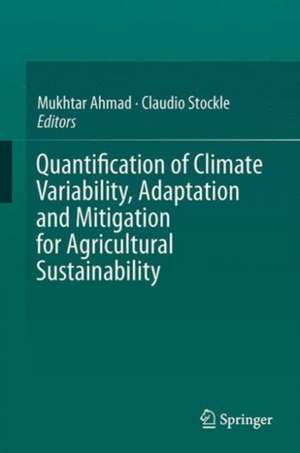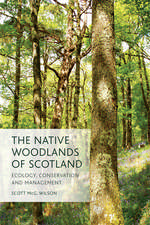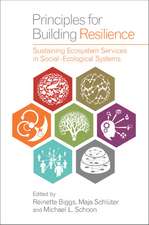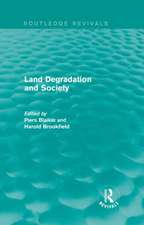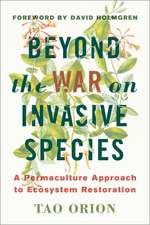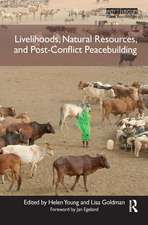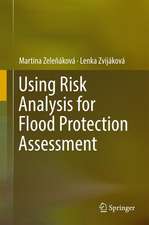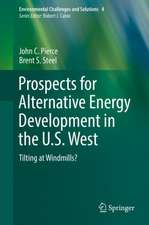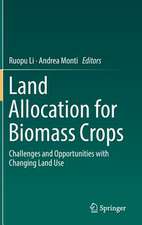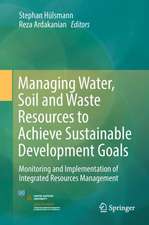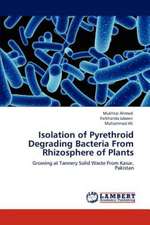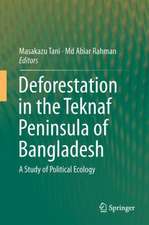Quantification of Climate Variability, Adaptation and Mitigation for Agricultural Sustainability
Editat de Mukhtar Ahmed, Claudio O. Stockleen Limba Engleză Hardback – 20 sep 2016
- Management of GHG emissions
- Crop models as decision support tools
- QTL analysis
- Crop water productivity
- Impacts of drought on cereal crops
- Silvopastoral systems
- Changing climate impact on wheat-based cropping systems of South Asia
- Phosphorous dynamics under changing climate
- Role of bioinformatics
| Toate formatele și edițiile | Preț | Express |
|---|---|---|
| Paperback (1) | 572.85 lei 38-44 zile | |
| Springer International Publishing – 11 iun 2018 | 572.85 lei 38-44 zile | |
| Hardback (1) | 596.28 lei 38-44 zile | |
| Springer International Publishing – 20 sep 2016 | 596.28 lei 38-44 zile |
Preț: 596.28 lei
Preț vechi: 745.35 lei
-20% Nou
Puncte Express: 894
Preț estimativ în valută:
114.11€ • 118.70$ • 94.21£
114.11€ • 118.70$ • 94.21£
Carte tipărită la comandă
Livrare economică 08-14 aprilie
Preluare comenzi: 021 569.72.76
Specificații
ISBN-13: 9783319320571
ISBN-10: 3319320572
Pagini: 506
Ilustrații: X, 437 p. 110 illus., 77 illus. in color.
Dimensiuni: 155 x 235 mm
Greutate: 0.99 kg
Ediția:1st ed. 2017
Editura: Springer International Publishing
Colecția Springer
Locul publicării:Cham, Switzerland
ISBN-10: 3319320572
Pagini: 506
Ilustrații: X, 437 p. 110 illus., 77 illus. in color.
Dimensiuni: 155 x 235 mm
Greutate: 0.99 kg
Ediția:1st ed. 2017
Editura: Springer International Publishing
Colecția Springer
Locul publicării:Cham, Switzerland
Cuprins
1. Greenhouse Gas Emissions and Climate Variability: An Overview (Mukhtar Ahmed).- 2. Greenhouse gas emissions due to meat production in the last fifty years (Dario Caro).- 3. Modeling the impact of climate variability on crops in Sub-Saharan Africa (Ephraim Sekyi-Annan) 4. Modeling Nitrogen Use Efficiency under Changing Climate (Muhammad Aqeel Aslam).- 5. Climate variability impact on Rice production: Adaptation and Mitigation strategies (Mukhtar Ahmed).- 6. QTL Modelling: An Adaptation Option in Spring Wheat for Drought Stress (Muhammad Umair Aslam).- 7. Soil and Water Assessment Tool (SWAT) for Rainfed Wheat Water Productivity (Atif Mehmood).- 8. Effects of abiotic stress in crop production (Portrait Pierluigi Calancas).- 9. Drought Tolerance in Cereal grain crops under changing climate (Zohra Aslam) 10. Wheat Physiological Response under drought (Raseela Ashraf).- 11. Silvopastoral systems: Best Agroecological Practice for Resilient Production Systems under Dryland and DroughtConditions (Solorio S. F. J.).-
12. Climate variability impact on Wheat production in Europe: Adaptation and Mitigation strategies (Salem Alhajj Ali).- 13. Quantification of climate change and variability impacts on maize production at farm level in the Wami River sub-basin, Tanzania (Sixbert K Mourice).- 14. Climatic Variability Impact on Wheat-based cropping systems of south Asia: Adaption and Mitigation (Amanpreet-Kaur).- 15. Models to Study Phosphorous Dynamics under Changing Climate (Waqas Ijaz).- 16. Studying Impact of Climate Change on Wheat Yield by Using DSSAT and GIS: A Case Study of Pothowar Region (Mahwish Jabeen).- 17. A Role of BIOINFORMATICS in Agriculture (Zohra Aslam).
Notă biografică
Dr. Claudio Stöckle’s research is in the Land, Air, Water Resources and Environmental Engineering (LAWREE) research emphasis area. His focus is on the development and application of analytical tools to study, understand and manage the interaction between soil, weather, and crops. He is particularly interested in modeling the environmental impact of agricultural production at the field and water shed levels and in further enhancement and support of the Agricultural Crop Systems Modeling Software (CropSyst) he as developed.
Dr. Mukhtar Ahmed is Assistant Professor at PMAS, Arid Agriculture University Rawalpindi Pakistan. His research focuses on the impact of climate change on crop ecology and rainfed ecosystem management. He is involved in the use of statistical and dynamic models as risk management tools to mitigate the challenges of changing climate. Now a days he is working as Post Doctorate Research Associate in Department of Biological Systems Engineering Washington State University, Pullman in USDA NIFA-funded project “Regional Approaches to Climate Change for Pacific Northwest Agriculture”. He is involved in the regional assessment of yields, water and carbon footprint for baseline and future climatic conditions using multimodel ensemble approach. He is involved in the models (APSIM, CropSyst, DSSAT, EPIC & STICS) calibration, validation and sensitivity analysis for wheat based cropping system in PNW USA as well as regional assessment of yields, water and carbon footprint for baseline and future climatic conditions using RCP 4.5 and 8.5 under 14 GCMs. This will ultimately help to design management options for winter wheat crop yield sustainability under climate variability and provide risk management analysis. He is also interested to work on modelling biomass flows at landscape level and the dynamics of organic matter in soil.
His research interest includes studying response of cropping systems, soil water and nutrient dynamics under rainfed region to optimize crop yield under climate variability. Ahmed conducted research on abiotic stress, Si fertilization, nutrient use efficiency, forecasting using climatic drivers, dryland management, crop production under changing climate and simulation modeling. He completed one project as PI to investigate Si as potential fertilizer to increase drought tolerance in crops. He has been co PI on two HEC Pakistan projects, one completed and one ongoing, studying carbon footprints using CENTURY model. In 2011-12 he won APCC Young scientist Scholarship and worked on Climate Variability and Predictability for Rainfed Areas of South Asia
Dr. Mukhtar Ahmed is Assistant Professor at PMAS, Arid Agriculture University Rawalpindi Pakistan. His research focuses on the impact of climate change on crop ecology and rainfed ecosystem management. He is involved in the use of statistical and dynamic models as risk management tools to mitigate the challenges of changing climate. Now a days he is working as Post Doctorate Research Associate in Department of Biological Systems Engineering Washington State University, Pullman in USDA NIFA-funded project “Regional Approaches to Climate Change for Pacific Northwest Agriculture”. He is involved in the regional assessment of yields, water and carbon footprint for baseline and future climatic conditions using multimodel ensemble approach. He is involved in the models (APSIM, CropSyst, DSSAT, EPIC & STICS) calibration, validation and sensitivity analysis for wheat based cropping system in PNW USA as well as regional assessment of yields, water and carbon footprint for baseline and future climatic conditions using RCP 4.5 and 8.5 under 14 GCMs. This will ultimately help to design management options for winter wheat crop yield sustainability under climate variability and provide risk management analysis. He is also interested to work on modelling biomass flows at landscape level and the dynamics of organic matter in soil.
His research interest includes studying response of cropping systems, soil water and nutrient dynamics under rainfed region to optimize crop yield under climate variability. Ahmed conducted research on abiotic stress, Si fertilization, nutrient use efficiency, forecasting using climatic drivers, dryland management, crop production under changing climate and simulation modeling. He completed one project as PI to investigate Si as potential fertilizer to increase drought tolerance in crops. He has been co PI on two HEC Pakistan projects, one completed and one ongoing, studying carbon footprints using CENTURY model. In 2011-12 he won APCC Young scientist Scholarship and worked on Climate Variability and Predictability for Rainfed Areas of South Asia
Textul de pe ultima copertă
This book is a comprehensive volume dealing with climate change impacts on agriculture, and which can help guide the redesign of agricultural management and cropping systems. It includes mitigation techniques such as use of bioenergy crops, fertilizer and manure management, conservation tillage, crop rotations, cover crops and cropping intensity, irrigation, erosion control, management of drained wetlands, lime amendments, residue management, biochar and biotechnology. It also includes
- Management of GHG emissions
- Crop models as decision support tools
- QTL analysis
- Crop water productivity
- Impacts of drought on cereal crops
- Silvopastoral systems
- Changing climate impact on wheat-based cropping systems of South Asia
- Phosphorous dynamics under changing climate
- Role of bioinformatics
Caracteristici
The first book to cover quantification of climate variability The only book dealing with greenhouse gas emissions and climate variability Brings together a group of top scholars on the much debated issue of climate change
